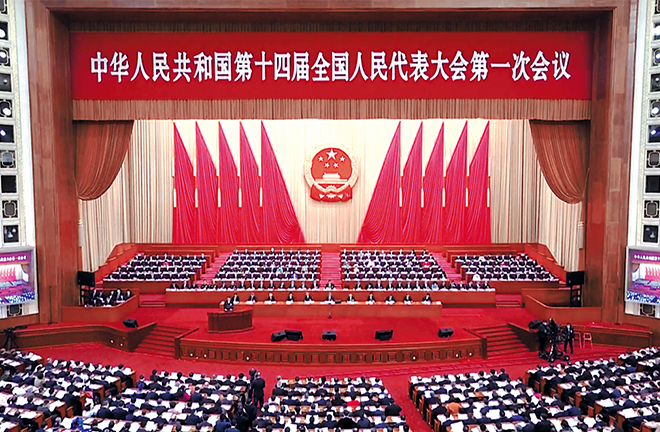Academics laud government work report

The First Session of the 14th National People’s Congress opened in Beijing on March 5. Photo: CFP
The First Session of the 14th National People’s Congress (NPC) opened in Beijing on March 5. Chinese Premier Li Keqiang delivered the Report on the Work of the Government at the opening meeting, reviewing the government work in 2022 and over the past five years, and offering recommendations for the work of government in 2023.
Remarkable achievements
According to the report, China’s GDP grew by 3% in 2022. A total of 12.06 million urban jobs were added, with the year-end surveyed urban unemployment rate falling to 5.5%. The consumer price index (CPI) rose by 2%. The total volume of trade in goods rose by 7.7 %. The deficit to GDP ratio was kept at 2.8%. A series of figures and facts outline the extraordinary journey China went through in the past year.
Quan Heng, an NPC deputy and secretary of the CPC Committee of the Shanghai Academy of Social Sciences, said that China’s economy has generally maintained high-quality development momentum amid the impact of more-than-expected international and domestic factors, which further demonstrates its strong resilience, vast room, and sufficient vitality.
The past five years have been likewise momentous and remarkable. Particularly, economic strength reached new heights. According to the report, the country’s GDP increased to 121 trillion yuan, registering an annual growth rate of 5.2% over the past five years. Over the past decade, the GDP has increased by almost 70 trillion yuan at an annual rate of 6.2%. China has achieved a medium high rate of economic growth given its large economic aggregate and transitioned to high-quality development.
Moreover, government revenue increased to 20.4 trillion yuan. Annual grain output remained steady at over 650 million metric tons for several consecutive years. The total value added of industry exceeded the 40 trillion yuan mark, and average yearly urban job growth hit more than 12.7 million. Foreign exchange reserves remained stable at over $3 trillion, according to the report.
In the past five years, China witnessed relatively rapid economic growth despite both difficulties in domestic economic restructuring and complex international scenarios, as well as the impact of COVID-19 for three years, said Lu Ming, a member of the National Committee of the Chinese People’s Political Consultative Conference (CPPCC) and a professor of economics at Shanghai Jiao Tong University. He attributed these achievements partly to deepened reforms in key areas and stimulated market vitality and social creativity.
Most impressively, the government has further streamlined administration and delegated power, and broadened market access with full implementation of the negative list system, Lu said, adding that since the introduction of the system, the negative list has been shortened by 64%.
Going forward
The government work report also sets main targets for development in 2023, projecting GDP growth of around 5%, around 12 million new urban jobs, surveyed urban unemployment rate of around 5.5%, CPI increase of around 3%, and growth in personal income that is generally in step with economic growth, among other targets.
These projected targets appropriately reflect the overall requirements and goals of China’s economy to stabilize growth, prices, and employment this year, Quan said. They showcase the government’s determination to coordinate the effective improvement of economic quality and reasonable growth of quantity and are also conducive to the high-quality development of the Chinese economy in the medium and long term.
After listening to Premier Li’s report, Zhang Bin, a member of the CPPCC National Committee and deputy director of the Institute of World Economics and Politics at the Chinese Academy of Social Sciences, pointed out that the report shows a very clear understanding of the difficulties and challenges in current economic operation. It has spotted the principal contradictions while putting forward explicit and targeted suggestions for this year’s work priorities.
In the context of weakening global economic and trade growth momentum, and increasing external suppression and containment, the contribution of overseas market demand to China’s economic growth will decline significantly in 2023, so expanding domestic demand has become the top priority for current economic work, Zhang said.
The report proposes expanding consumption through multiple measures, such as boosting the incomes of urban and rural residents through multiple channels, stabilizing spending on big-ticket items, and promoting recovery in consumption of consumer services. It also underlines efforts to speed up the implementation of major projects set out in the 14th Five-Year Plan (2021–25) and launch urban renewal actions.
“These investments will benefit not only the present, but also the long-term development of China’s economy and the improvement of the general public’s well-being,” Zhang said.
Edited by CHEN MIRONG
